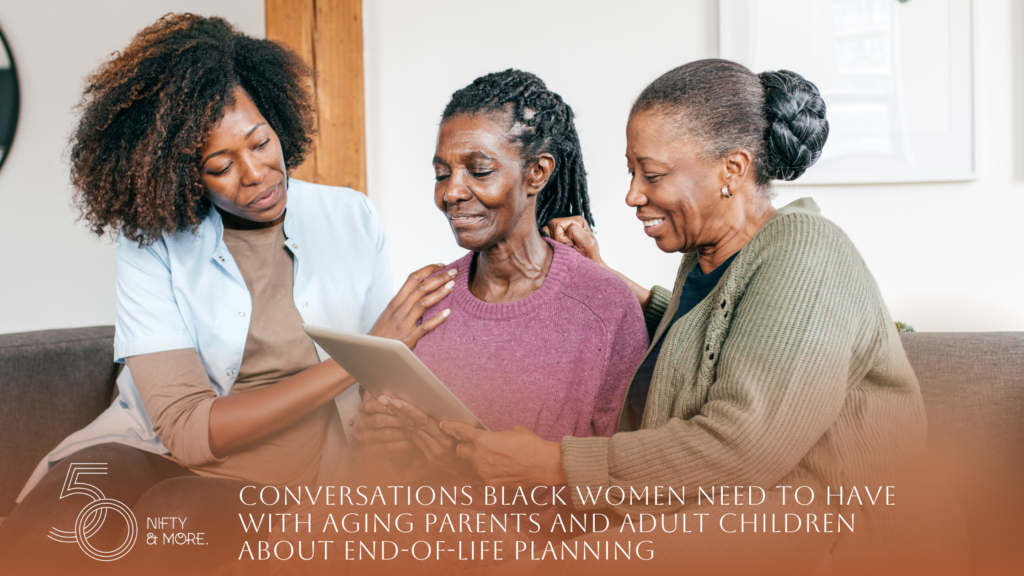
End-of-life planning is often a challenging and sensitive topic, particularly within the Black community, where cultural norms and historical contexts influence how family discussions about death and dying unfold. Black women, often seen as the backbone of their families, play a crucial role in initiating these important conversations with both their aging parents and adult children. Here’s a guide to help navigate these discussions with empathy and clarity.

Understanding the Importance of End-of-Life Planning
- Cultural Context: In many Black families, there is a rich tradition of valuing family ties and collective decision-making. However, conversations about death can be fraught with discomfort due to historical trauma and a lack of open dialogue about mortality.
- Practical Considerations: Planning for end-of-life care, including healthcare directives, funeral arrangements, and financial responsibilities, is essential for ensuring that wishes are respected and burdens are minimized for loved ones.

Conversations with Aging Parents
- Approach with Sensitivity: Begin these discussions by expressing your love and concern. Use open-ended questions to understand their wishes and feelings about aging and end-of-life care. For instance, ask, “What are your thoughts on how you want to be cared for as you age?”
- Discuss Health Care Preferences: Talk about medical decisions and preferences regarding interventions. Encourage your parents to articulate their wishes for medical treatment, especially if they become unable to communicate these choices in the future.
- Financial Planning: Address the importance of discussing wills, insurance policies, and financial responsibilities. This conversation can help clarify how assets will be managed and ensure that there are no surprises or disputes among family members later.
- Funeral Arrangements: Discuss preferences for funeral services, burial, or cremation. Understanding your parents’ wishes can lessen the emotional burden on the family during a difficult time.
- Creating a Living Will: Encourage them to consider drafting a living will or healthcare proxy, which outlines their medical preferences and designates someone to make decisions on their behalf if they are unable to do so.

Conversations with Adult Children
- Modeling Open Dialogue: As a Black woman, demonstrating openness about end-of-life topics can encourage your adult children to share their feelings and thoughts as well. Share your own values and preferences regarding end-of-life planning.
- Educate on the Importance of Planning: Help them understand why it’s essential to have these discussions, emphasizing that planning can alleviate stress during emotional times and ensure that their wishes are known and respected.
- Encourage Questions and Concerns: Invite your children to express any fears or concerns they have about death and dying. This can lead to a deeper understanding of each other’s perspectives and needs.
- Discuss Cultural Heritage: Share how cultural traditions play a role in mourning and remembrance within the Black community. This can foster a sense of connection and understanding of the family’s values surrounding death.
- Intergenerational Planning: Encourage your adult children to think about their own end-of-life planning. Discuss how they can create their own plans while also being mindful of the responsibilities they may inherit.

Tips for Effective Communication
- Choose the Right Time and Place: Find a comfortable, private setting where everyone can speak freely without distractions.
- Be Patient and Compassionate: Recognize that these conversations can be emotionally charged. Allow space for feelings and acknowledge that it may take time to address all topics.
- Provide Resources: Offer literature, workshops, or community resources that can assist in understanding end-of-life planning. This can help normalize the conversation and provide a framework for discussing these issues.
Engaging in end-of-life planning conversations is a vital aspect of caring for both aging parents and adult children. For Black women, leading these discussions can empower families, honor cultural values, and ensure that wishes are respected. By approaching these conversations with love, sensitivity, and openness, families can navigate the complexities of end-of-life planning together, ultimately strengthening their bonds and preparing for the future with greater peace of mind
Be the first to comment